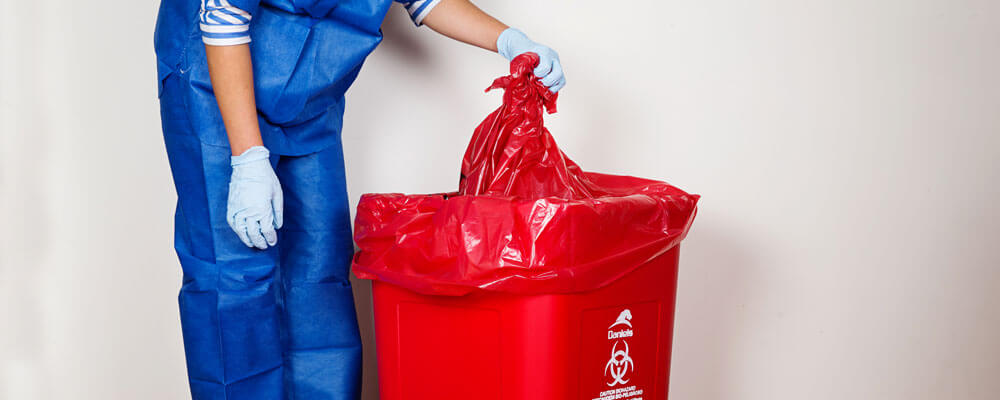Reliable Medical Waste Disposal Services: Partnering for a Cleanser Setting
Reliable Medical Waste Disposal Services: Partnering for a Cleanser Setting
Blog Article
Responsible Solutions: Understanding Medical Garbage Disposal Services
In the realm of health care, the correct disposal of clinical waste is an essential element that requires mindful consideration. As healthcare centers produce various kinds of waste that need customized handling, understanding the nuances of clinical waste disposal services is paramount.
Relevance of Correct Clinical Garbage Disposal
Appropriate medical waste disposal is important in preserving a secure and sanitary environment within healthcare centers. In medical care settings, different sorts of waste are generated daily, consisting of contagious materials, sharps, expired medications, and chemical compounds. Otherwise appropriately managed, these wastes can pose significant risks to both medical care employees and the public. Improper disposal can result in the spread of infections, injuries from sharps, contamination of water resources, and damage to the atmosphere.

Kinds Of Medical Waste
Within healthcare centers, a varied range of waste materials classified as medical waste is created, each calling for certain handling and disposal methods. Pathological waste, which consists of tissues, body organs, and body parts, demands correct disposal to appreciate the self-respect of the departed and prevent any kind of biohazards. Comprehending the different types of clinical waste is critical for health care facilities to implement efficient waste management techniques and shield public health and the setting.
Rules and Compliance
Healthcare centers have to stick to strict policies relating to the handling and disposal of clinical waste to make certain compliance with lawful demands and safeguard public health. These guidelines are placed in place to avoid the spread of infections, safeguard the atmosphere, and keep the safety of health care employees and the basic public. Various governing bodies, such as the Environmental Defense Firm (EPA), the Occupational Safety and Health Management (OSHA), and the Division of Transport (DOT), have particular standards that healthcare centers have to follow.
To abide with these guidelines, medical care facilities need to properly set apart, store, transport, and dispose of different types of clinical waste. This consists of sharps waste, contagious waste, contaminated materials, and pharmaceutical waste, each calling for details managing procedures. Facilities has to additionally keep precise records of waste generation and disposal to show compliance throughout inspections.
Non-compliance with clinical waste policies can cause extreme charges, penalties, and damage to the facility's track record. As a result, it is necessary for health care facilities to remain notified concerning the current laws and apply robust compliance measures to safeguard public health and the my response atmosphere.
Advantages of Expert Disposal Providers
Involving specialist medical waste disposal solutions provides healthcare facilities a efficient and trusted solution for taking care of dangerous materials. By outsourcing this vital task to professionals, medical care centers can guarantee conformity with guidelines while concentrating on giving top quality care to clients. Among the essential advantages of expert disposal services is the know-how they bring to the table. These solutions employ experienced specialists who are fluent in dealing with various sorts of clinical waste, guaranteeing proper segregation, disposal, transportation, and product packaging.
Additionally, specialist disposal services use modern equipment and follow sector ideal practices to reduce ecological influence and lower the threat of contamination. This not only promotes a much safer workplace for medical care staff but also adds to overall public health and wellness and security. Furthermore, outsourcing medical waste disposal can lead to cost financial savings over time by eliminating the requirement for internal administration and disposal systems.
Sustainable Practices in Healthcare

One secret lasting method in healthcare is waste decrease. By applying methods to decrease unneeded packaging, single-use products, and total waste generation, healthcare centers can significantly decrease the quantity of waste sent out to landfills or incineration. In addition, recycling programs for products like plastic, paper, and glass can better decrease the environmental impact of medical care operations.

Verdict
In final thought, correct clinical garbage disposal is important in maintaining a safe and healthy atmosphere for both healthcare workers and the public. Recognizing the different kinds of clinical waste, following guidelines and compliance criteria, and using specialist disposal services are essential actions in accountable waste monitoring. By embracing lasting methods in medical care centers, we can lower ecological effect and guarantee the well-being of all people associated with the healthcare sector.
As medical care facilities create various kinds of waste that need specialized handling, recognizing the nuances of medical waste disposal solutions is critical.Within health care centers, a diverse selection of waste materials identified as medical waste is produced, each calling for details handling and disposal techniques. Recognizing the various types of medical waste is important for healthcare centers to implement effective waste monitoring strategies and secure public wellness and the environment.
By implementing methods to reduce unneeded packaging, single-use products, and total waste generation, medical care centers can significantly lower the amount of waste sent to land fills or incineration. Recognizing the various kinds of clinical waste, adhering to laws and compliance standards, and utilizing professional disposal services are necessary actions in liable waste monitoring.
Report this page